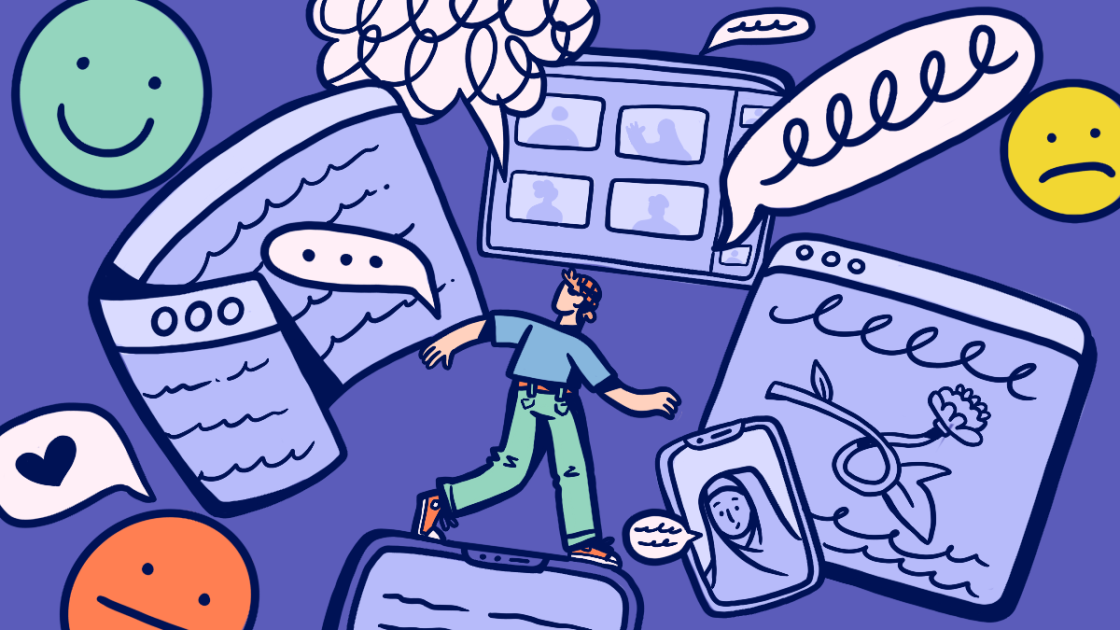How to stay safe online when viewing mental health content
Here are some of the ways that you can protect your emotional wellbeing while interacting with mental health information online.

If you spend time on the internet, you will likely encounter content on mental health difficulties, including suicidal thoughts, self-harm, or eating disorders. This content can come in many forms, and that’s why it is especially important to be mindful about staying safe online. It could be a news article about a celebrity who died by suicide, a video of a young person talking about how they recovered from self-harm, or a mental health charity sharing information and support for eating disorders.
In this factsheet, you will find some steps you can take to mind your emotional wellbeing if you’re exposed to online content about suicide, self-harm, or eating disorders.
Why do people look at mental health content online?
Sometimes, you might be actively seeking mental health-related content or information. If you’re dealing with one of these issues yourself, you might search for advice and support you can trust. You might look for other people who have similar experiences.
Maybe someone in your life is facing one of these challenges and you want to get a better understanding of what they’re going through. You might want to know how you can help, or maybe you’re just curious about these topics and want to learn more.
Other times, you might be exposed to this content without meaning to. A video or livestream can appear on your feed, an account you follow can share something to their story, or you can stumble upon a discussion in a comment section.
Whether you’re searching for it or you encounter it unexpectedly, this content can have an impact. It can affect your mood and thought patterns, and can become overwhelming. This is especially true if you’re not being mindful of what content you’re consuming and how often you’re consuming it.
Tips for staying safe online while looking at mental health content
Interacting with reliable online sources of mental health information and lived experiences can have many benefits. Below are some of the steps you can take to protect your emotional and psychological well-being while looking at this content.
Check in with how you feel
If you see a piece of content on one of these topics, pay attention to how you react to it. It can be helpful to ask yourself the following questions:
- What thoughts and feelings is this bringing up for me?
- Does this content make me feel understood and supported or judged?
- Do I feel calmer and more informed, or overwhelmed?
It might be time to take a step back or log off if the content makes you feel:
- Anxious, hopeless, or ashamed
- Emotionally, mentally, or physically exhausted
- Compelled to engage in risky behaviours
Train your algorithms
The content that shows up on your feed is influenced by the social media accounts and posts you interact with the most. Social media platforms use algorithms to try to give you more of what you engage with. This means that a quick search for support or information can lead to your feed being flooded by similar, and sometimes overwhelming, content. This can be risky when it comes to topics like suicide, self-harm, or eating disorders. Sometimes, people can be exposed to content that’s graphic, unhelpful, or harmful.
You can avoid this and stay safe online by training your algorithms in the following ways:
- Liking and engaging with supportive content
- Following helpful, recovery-focused accounts
- Muting or unfollowing accounts that make you feel worse, even if they’re well-intentioned
- Hiding or muting content based on certain phrases or hashtags
- Resetting your algorithm completely if you feel like having a fresh start (Bear in mind that this function may be available on some, but not all, platforms)
- Using “not interested” or “report” functions to keep yourself and others safe if you see harmful content
Check the sources
Not all online content is trustworthy. If someone is sharing advice or support information for suicide, self-harm or eating disorders, make sure it’s coming from a qualified source. Examples of reliable, qualified sources include:
- Mental health charities
- Government agencies
- Mental health professionals
You can get valuable insights from someone sharing their own lived experiences online. However, it’s important to remember that one person’s experience isn’t everyone’s experience. Be careful not to over-generalise or assume that what was helpful or unhelpful for one person will apply to all people. Being mindful of this fact can help everyone stay safe online.
Take breaks
Online spaces and communities that talk about suicide, self-harm, or eating disorders can sometimes feel like a lifeline. This is especially true if you’re struggling or feel like no one around you understands. However, even supportive communities can become overwhelming. Being surrounded by heavy or emotionally intense content all the time can take a toll on your mental health.
It may be time to take a break if:
- You are finding it hard to separate your own feelings from what you’re seeing online
- You’re comparing yourself and your challenges to others
- You are feeling like you have to keep checking in or posting to be part of a community
- You are feeling like you’re letting others down by focusing on recovery and getting better
Even if you decide to take a break from an online space, remind yourself that you always have the option to rejoin at another time. Many online support groups and spaces can offer many benefits, but stepping away from time to time can help you find balance. It can also give your mind a rest and your body the space to breathe.
You can learn more about how to safely viewing online content relating to suicide, self-harm and eating disorders by taking our free online course.
Feeling overwhelmed and want to talk to someone?
- Get anonymous support 24/7 with our text message support service
- Connect with a trained volunteer who will listen to you, and help you to move forward feeling better
- Whatsapp us now or free-text SPUNOUT to 50808 to begin.
- Find out more about our text message support service
If you are a customer of the 48 or An Post network or cannot get through using the ‘50808’ short code please text HELLO to 086 1800 280 (standard message rates may apply). Some smaller networks do not support short codes like ‘50808’.






